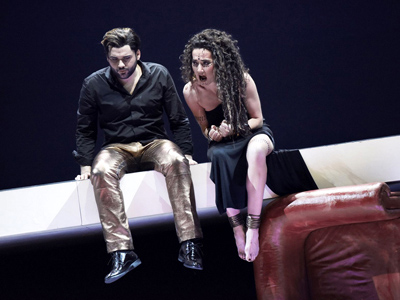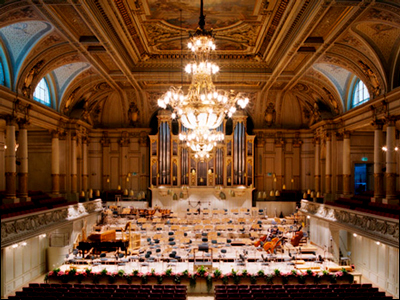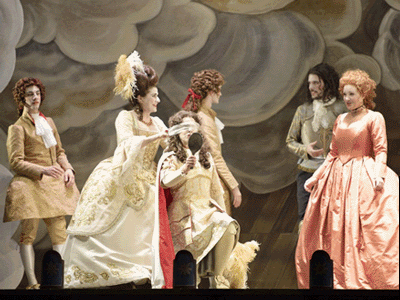
By ANDREW POWELL
Published: March 4, 2017
ZURICH — The goal presumably was to freshen the tale of Jason and his cooperative wife Medea as told by Thomas Corneille (filtering his brother Pierre and Euripides) and mise en musique by Charpentier. But stage director Andreas Homoki’s new Médée (1693) for Opernhaus Zürich, where he doubles as Intendant, presents only facile reductions of character and situation, eschewing spectacle and perversely going for laughs. Early on, we face the plain outside wall of a stadium where Jason the Argonaut and friends are playing cricket and rugby (at the same time). Later we encounter Oronte the soldier, on whose capacities the story turns but who counts for little once established as an imbecile; and Créon the king, a boor who will die without engendering sympathy. Homoki’s concept might have worked, in its contrarian way, had he developed a matching rebuff for each element of this Lullian tragédie and turned the thing upside down. Alas, he comes nowhere close to achieving that, unable even to explore potential in the divertissements and intermèdes and consequently getting trapped by them into narrative repetition. Lively costumes offset the bland sets, but they are plagued with cliché: kids in platinum wigs, military officers in sunglasses, demons in blackface (with afros). A blown opportunity, then, considering this opera’s rarity and the perfect scale of the house, at 1,100 seats, not to mention the caliber of the musicians assembled.
After partnering with Homoki on an acclaimed David et Jonathas (1688) at Aix-en-Provence five years ago, Charpentier veteran William Christie may have expected a more potent production, and it was unclear whether he sanctioned omitting the Prologue to shave twenty minutes off the 185-minute score. Zurich at least gave him a strong cast, centered on the ideally matched Médée of Stéphanie d’Oustrac and Jason of Reinoud van Mechelen. At the Feb. 12 performance, late in the run here, the mezzo-soprano sang with expressive, focused sound, avoiding shrillness in her tough Act III monologues, and she invested the role with dignity, deepening a portrayal filmed thirteen years ago at Versailles. The honey-toned, equally communicative tenor floated exquisite soft notes and declaimed Corneille’s text with aptly deceptive charm. Soprano Mélissa Petit, a modest yet sensitive Créuse, was required to mime much of the time, diluting her presence when it mattered. Ivan Thirion’s rich baritone suited the duties of Oronte despite projection problems, while bass Nahuel di Pierro neatly articulated Creon’s music. Christie enforced fluency, directly or indirectly, in the text-dependent vocal lines. He knowingly weighted Charpentier’s intriguing dissonances, applied nuanced but always precise shifts in the orchestral colors and flawlessly coordinated pit and stage. The Chor der Oper Zürich (with five hautes-contre from Les Arts Florissants) made affecting contributions, notably in the lament on the king’s death, and Orchestra La Scintilla, superb in all sections, seemed to revel in its assignment.
Photo © Toni Suter and Tanja Dorendorf
Related posts:
Petrenko Hosts Petrenko
Antonini Works Alcina’s Magic
Winter Discs
Tonhalle Lights Up the Beyond
Nitrates In the Canapés

